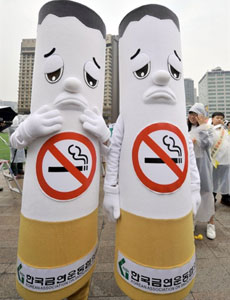New Delhi (Mizzima) – Despite the Control of Smoking and Consumption of Tobacco Product Law, many Burmese don’t obey the law which should be strictly enforced, says the Myanmar [Burma] Doctors’ Association (MDA).

The law establishes no-smoking zones in Burma, but many smokers ignore the law. The law also bans the sale of cigarettes singly or in a package containing less than 20, but many vendors and shops do not follow the law.
‘Some Institutions have banned smoking in some areas, but government departments have not established no-smoking zones’, Dr. Khin Soe Win, the MDA general-secretary told Mizzima.
The law declares non-smoking areas in hospital buildings, clinics, stadiums and education buildings.
The law came into effect on May 4, 2007.
World No Tobacco Day was May 31. The World Health Organization’s Framework Convention on Tobacco Control is the theme of this year's observation.
According to the WHO Global Youth Tobacco Survey (GYTS), the prevalence of smoking among teenagers in Burma was 10.2 per cent in 2001 and 4.9 percent in 2007.
The MDA estimated that at least 10 percent of teenagers smoke.
According to the GYTX survey, despite a significant reduction in the proportion of teenagers smoking cigarettes, the use of other tobacco products had increased from 5.7 percent in 2001 to 14.1 percent in 2007.
‘I want to urge the people who usually chew betel quid not to use tobacco products in their betel quid if possible’, said a doctor in Rangoon.
Not only ordinary people but also many health officials and workers in Burma smoke, said Khin Soe Win.
‘We have educated the public in many ways. But, people often ignore the warnings. Even doctors smoke. Some of them have had serious heart attacks, but they have not quit smoking’, he said.
Cigarette smoke contains around 4,300 chemicals; the most dangerous is nicotine. Other substances are carbon monoxide, benzene and ammonia.
A Rangoon doctor said: “My father-in-law died of lung cancer. He knew that it was the consequence of smoking. One of his sons also died of lung cancer recently. Another son has suffered from tongue cancer as a result of smoking. Although he knows the disease is a consequence of smoking, he still smokes sometimes’.
Dr. Khine So Win said, ‘The most serious diseases are cancers, especially lung cancer and mouth and tongue cancers. Other types of damage include blood clotting, arterial problems and stomach damage’.
The MDA has urged the government to take legal action in accordance with the laws.
What should be done?
“Without enforcement, laws and rules are useless’, said Khine Soe Win. ‘To sell alcohol, you need to have a license but to sell cigars, cigarettes and cheroots, you don’t need to have a license. If cigarettes sellers need licenses, there can be some restrictions. And if the authorities introduce a higher tax on tobacco products, the number of the smokers may be reduced. Plus, the authorities need to prevent importing cheap cigarettes form border areas’.
In the 20th century, tobacco has killed an estimated 100 million people worldwide and it could kill one billion during 21st century, according to WHO.
Khine Soe Win said that the government should use more media to educate the public about the consequences of smoking.
‘The government should educate the public via multimedia, especially using a combination of pictures and sound, I think. Now the state-run TV stations sometimes broadcast programs to educate the public about the adverse consequences of smoking. But most of these programs are broadcasted at times when people hardly watch TV’, Khine Soe Win said.



